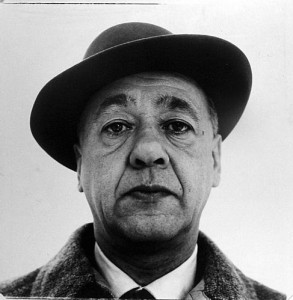Eugène Ionesco (born Eugen Ionescu) was born on November 26, 1909 in Slatina, Romania. He grew up in France, but returned to Romania after his parent’s divorce in 1925 where he obtained a degree in French at the University of Bucharest. He married Rodica Burileanu and they had a daughter. In 1938, he and his family returned to Paris where he obtained his doctorate and eventually settled down after the liberation. It was at the age of 40 that he decided to learn English using the Assimil method, where one copies whole sentences in order to memorise them and learn grammar organically. It was this experience in attempting to learn English that inspired him to turn from writing poems and criticism to plays. His first one-act anti-play, The Bald Soprano, took the undisputedly true, banal sentences of his exercises and revealed the illogical world they created. The Bald Soprano premiered in 1950, but was largely ignored until the support of several major critics was thrown behind it, at which point is quickly became considered a modern classic. [1] His “anti-play” that eschewed the traditional methods of plot and character development was the foundational text of what became the Theatre of the Absurd. After The Bald Soprano, Ionesco wrote several other one-acts including The Lesson and The Chairs. Several years later, he began writing full-length plays the most popular of which is Rhinoceros (1959) which speaks out against the dangers of ideological conformism viewed throughout World War II. All of his plays use surrealistic techniques to dramatise the absurdity of the actions of day to day life, the futility of modern society, the insignificance of humanity, and the meaninglessness of societal and social conventions. Ionesco was elected to the French Academy in 1970 for his contributions to literature and theatre as well as several other awards and honorary doctorates from several universities. Ionesco continued to write through the 1970’s, when his only novel, The Hermit was published in 1975. Ionesco passed away in Paris on the 28th of March 1994 at 84 years old. In total, Ionesco wrote 28 plays and several volumes of essays and criticism along with his novel.[2]
[1]“The Bald Soprano.” The Bald Soprano. Theatre History.com, 17 Oct. 2006. Web. 28 Apr. 2016.
[2]The Editors of Encyclopædia Britannica. “Eugene Ionesco.” Encyclopedia Britannica Online. Encyclopedia Britannica, n.d. Web. 28 Apr. 2016.


